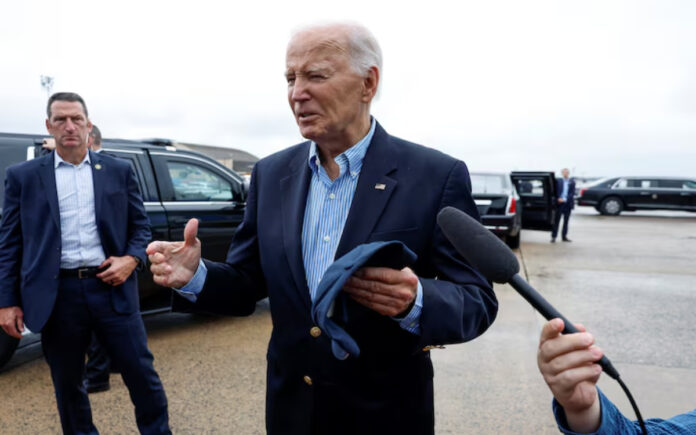Washington: U.S. President Joe Biden stated on Wednesday that he would not endorse any Israeli strike on Iran’s nuclear facilities in response to Iran’s recent ballistic missile attack. He emphasized the need for Israel to act “proportionally” against its regional adversary.
Biden’s comments came a day after Iran launched over 180 missiles at Israel, an operation he previously characterized as “ineffective”. In response, Israeli Prime Minister Benjamin Netanyahu pledged that Iran would face consequences for its actions.
“We’ll be discussing with the Israelis what they’re going to do, but all seven of us (G7 nations) agree that they have a right to respond but they should respond proportionally,” Biden told reporters before boarding Air Force One.
Analysts suggest that Israel’s response may be more aggressive than its previous reactions to Iranian missile and drone strikes, indicating that it could target Tehran’s nuclear or oil infrastructure. However, experts also anticipate U.S. efforts to moderate Israel’s response to prevent a broader regional conflict.
When asked if he would support Israel attacking Iranian nuclear sites, which has been a long-standing threat, Biden firmly responded, “The answer is no.” He also indicated that further sanctions would be imposed on Iran and that he would be in contact with Netanyahu soon. “Obviously, Iran is way off course,” he stated.
Also Read | Deadliest Day for Israel: Eight Soldiers Fall in Lebanon Fighting
Israeli officials have informed their U.S. counterparts that they are still determining the targets, timing, and methods for retaliating against Iran’s missile strike. According to a Washington source familiar with the discussions, Israel may not feel an immediate urge to retaliate, considering its success in countering the Iranian attack. However, there is concern that delaying a response could diminish its deterrent effect.
In contrast to the U.S. stance after Iran’s April assault, the Biden administration is not pressuring Israel to refrain from retaliation but is urging it to carefully evaluate potential consequences.
Iran’s missile attack has heightened regional tensions, complicating the Biden administration’s ongoing negotiations for a ceasefire in the nearly year-long Israel-Hamas war in Gaza, where an imminent resolution has been frequently anticipated.
As Biden approaches the end of his term, he faces significant domestic and international criticism for unwavering U.S. military support of Israel, a sentiment echoed by Vice President Kamala Harris, the Democrats’ presidential candidate.
Also Read | Astronomers Identify New Planet Orbiting the Closest Star to Our Solar System
The Middle East Is Currently on a “Knife’s Edge”
At a virtual event hosted by the Carnegie Endowment for International Peace on Wednesday, U.S. Deputy Secretary of State Kurt Campbell reiterated the view that Iran’s actions were “deeply irresponsible” and emphasized the necessity for a “return message”.
However, he cautioned that the Middle East is currently on a “knife’s edge”, raising concerns about “an even broader escalation” that could threaten both Israeli and U.S. strategic interests. “I think we tried to underscore our support for some of the actions that Israel has taken,” he added. “We have real wariness about an extended or substantial ground set of operations in Lebanon.”
Netanyahu has not always followed the Biden administration’s counsel throughout the ongoing Middle East conflict. The Israeli military is engaged in combat at its northern border against Iran-backed Hezbollah fighters, with Wednesday marking the deadliest day for Israeli forces in the year-long clashes, resulting in the deaths of eight soldiers.
Also Read | Keir Starmer’s First Talks in Brussels Signal New Era for UK-EU Relations
Iran announced that its recent missile barrage—its most extensive assault on Israel to date—was complete, barring any further provocation. Israel views Iran’s nuclear ambitions as an existential threat, while Tehran maintains that it is not pursuing nuclear weapon capabilities.
Iran’s nuclear facilities are dispersed across various locations, some situated deep underground. In 2015, Iran accepted limitations on its nuclear activities under a U.S.-led international agreement, which fell apart after then-President Donald Trump withdrew the U.S. in 2018. Since then, Iran has been accelerating its uranium enrichment program, significantly shortening the so-called “breakout time” to produce enough weapons-grade uranium for a nuclear bomb, now estimated at just a few weeks compared to at least a year under the 2015 accord.



